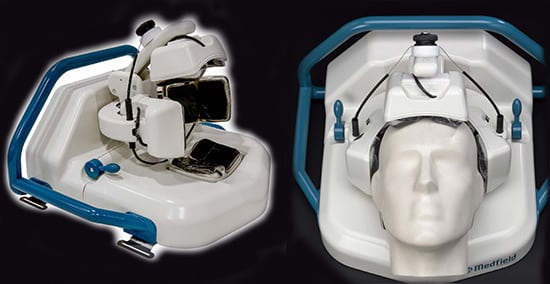
The Hunter Region NSW will become the international testing ground for a new microwave-imaging headpiece that helps ambulance and emergency teams rapidly diagnose stroke and other traumatic brain injuries.

The Hunter Region NSW will become the international testing ground for a new microwave-imaging headpiece that helps ambulance and emergency teams rapidly diagnose stroke and other traumatic brain injuries.
Just as portable defibrillators (colloquially known as Packer Whackers) revolutionised frontline care for heart-attack victims, the Strokefinder MD100 holds promise of early detection to potentially allow treatment to be administered en route to hospital.
Swedish firm Medfield Diagnostics, who developed the device, has signed an agreement with the Hunter Medical Research Institute in Newcastle to conduct further research and explore the diagnostic possibilities.
“The Strokefinder was largely spawned from research by Professor Mikael Persson at Chalmers University of Technology and neurophysiologist Professor Mikael Elam from Sahlgrenska University Hospital in Gothenburg, both of whom have strong links with Australian research,” HMRI Director Professor Michael Nilsson explained.
“They began using microwaves to investigate changes in brain density and their work eventually led to a focus on stroke and the problem of diagnosis.”
Professor Chris Levi*, Senior Staff Neurologist at John Hunter Hospital and Director of Clinical Research and Translation for Hunter New England Health, says that time-saving measures are critical when an ischemic stroke occurs, particularly in remote areas where travel to hospital often takes longer.
“The faster we begin thrombolysis treatment to dissolve the clot, the more brain can be salvaged,” Professor Levi said. “However, we must be absolutely sure that it’s not a haemorrhagic stroke, which occurs around 20 per cent of the time, because the treatment paths are vastly different.”
The Strokefinder imaging system differs fundamentally from x-ray and ultrasound, employing sophisticated microwave technology adapted from mobile phone and defence applications. It is compact, powerful, portable and has no known side effects.
The patient’s head is placed directly on the device and sequentially scanned by antennas emitting low-energy microwaves. These pulses “scatter” in brain matter, and bleeding patterns are then differentiated via an image-generating algorithm.
With preliminary studies having been conducted by Sahlgrenska University Hospital’s Stroke Unit, involving over 200 stroke patients, HMRI/Hunter New England Health researchers now plan to involve patients in the Hunter and extend the trial into the ambulance domain for the first time.
“The long-term goal is to have the Strokefinder in all ambulances, like the defibrillator for stroke,” Professor Nilsson said.
“The accuracy has been very good so far and if the platform can reach the level of CT scanning when it comes to diagnostic safety, it means that clot-busting treatment can start directly. The future looks promising.”
Medfield Diagnostics will provide personnel to assist HMRI in analysing results and further refining the device.
“It is a unique opportunity for us to be part of this project,” Professor Nilsson added. “The company turned to us because we are world leaders in stroke care and research, and the region itself provides a microcosm of rural and metropolitan communities.
“We’re also fortunate to have a very progressive ambulance service that works closely with the Stroke Unit at John Hunter Hospital.”
The first Strokefinder is expected to arrive during the first half of 2015.
* Professor Chris Levi is a Conjoint Professor of Medicine (Neurology) and Director of the University of Newcastle’s Priority Research Centre for Translational Neuroscience and Mental Health, researching in conjunction with HMRI’s Brain and Mental Health program. HMRI is a partnership between the University of Newcastle, Hunter New England Health and the community.
HMRI would like to acknowledge the Traditional Custodians of the land on which we work and live, the Awabakal and Worimi peoples, and pay our respects to Elders past and present. We recognise and respect their cultural heritage and beliefs and their continued connection to their land.
Hunter Medical Research Institute
We’re taking healthy further.
Locked Bag 1000
New Lambton
NSW, Australia, 2305


This site is protected by reCAPTCHA and the Google Privacy Policy and Terms of Service apply.
Copyright © 2024 Hunter Medical Research Institute | ABN: 27 081 436 919
Site by Marlin Communications
